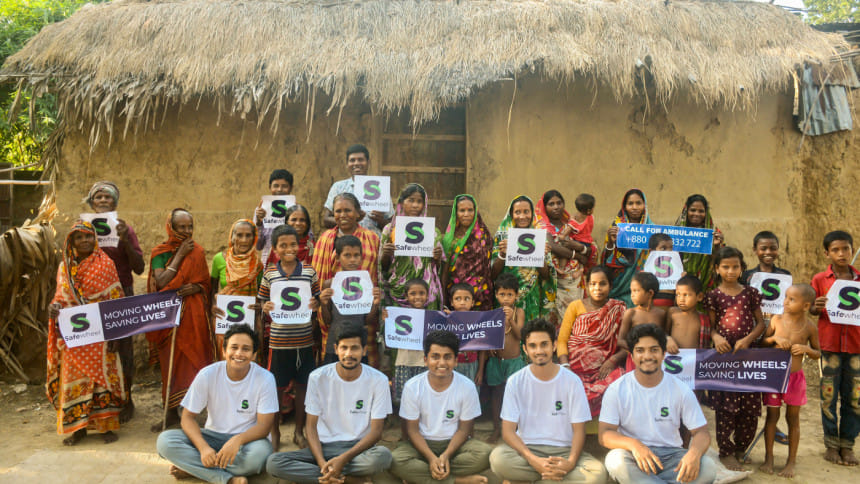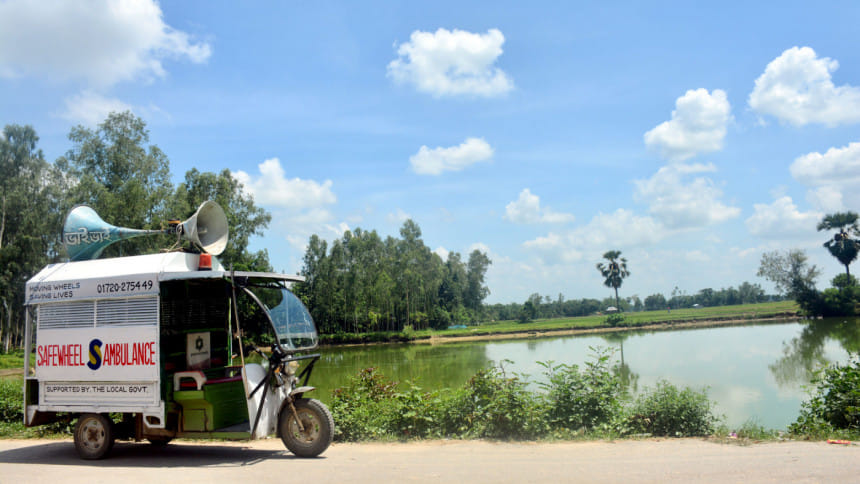Moving wheels, saving lives

Safewheel, founded by Rafiq Islam (Chief Executive Officer), Faysal Islam (Chief Business Development Officer) and Anas Hossain Makki (Chief Operating Officer), gained a wide audience in its formative days. What started out as an entry to the globally-renowned Hult Prize competition is now an internationally recognised social enterprise providing emergency medical transport services to rural Bangladesh. There are very few ambulance services in rural areas. Villagers rely on traditional three-wheelers, which can be life-threatening for patient transportation. Even if they get an ambulance, it is expensive. Team Safewheel wanted to create an affordable and innovative solution for the villagers.
The camaraderie that connects the three founders is imperative to the formation of the enterprise. Upon inquiring about why they chose the industry of emergency medical transport services, Rafiq says that the untimely death of his uncle compelled them to think of ways to improve things in this area. "My uncle passed away because of an unfortunate road accident a few years ago and in the rural region, there was a lack of emergency medical transport service providers. The situation provided me with the idea to try and create a solution," he says. "Thankfully, my friends chose to support the initiative as well." Safewheel was founded by the end of 2018 with close to 10 volunteers.
The primary motive behind the formation of the enterprise is to help individuals living in rural regions with finding ambulances when needed, regardless of the form of transportation. Rafiq explains that official ambulances are not likely to provide services in rural regions because the cost could be too high for the people who might be in dire need for ambulances. Secondly, the ambulance drivers are generally not accustomed to driving through rural areas.

He also mentions that ambulances do not always provide medical assistants, which they wish to change. Team Safewheel plans to begin their operations officially from this month. They also aim to provide discounts to pregnant women and underprivileged patients who may not have stable sources of income.
They were able to come quite far in their pre-launch phase after their successful trial period in Rajshahi for around four months. The result of the trial helped them to determine that they will be able to help around 25 patients move on an everyday basis, from January 2021.
Team Safewheel was invited to present their initiative before the UN as well. By the end of 2019, they received an award as one of the winners of Youth Co:Lab Bangladesh 2.0, co-created by United Nations Development Programme (UNDP) and Citi Foundation. The youth-led social entrepreneurship programme focused on implementing the Sustainable Development Goals. Team Safewheel participated in the Youth Co:Lab's regional final in Malaysia.
Although Safewheel may not have been actively operating during the Covid-19 pandemic, the founders in their own ways tried to raise awareness about the virus in their respective hometowns. Rafiq, for instance, communicated with schools, mosques and committees in Gazipur to spread information about the virus, and how to take precautions against it. The team further plans to launch inter-district regular ambulances, as the demand has increased during this pandemic.
The author is a freelancer. Write to her at [email protected].

 For all latest news, follow The Daily Star's Google News channel.
For all latest news, follow The Daily Star's Google News channel. 



Comments